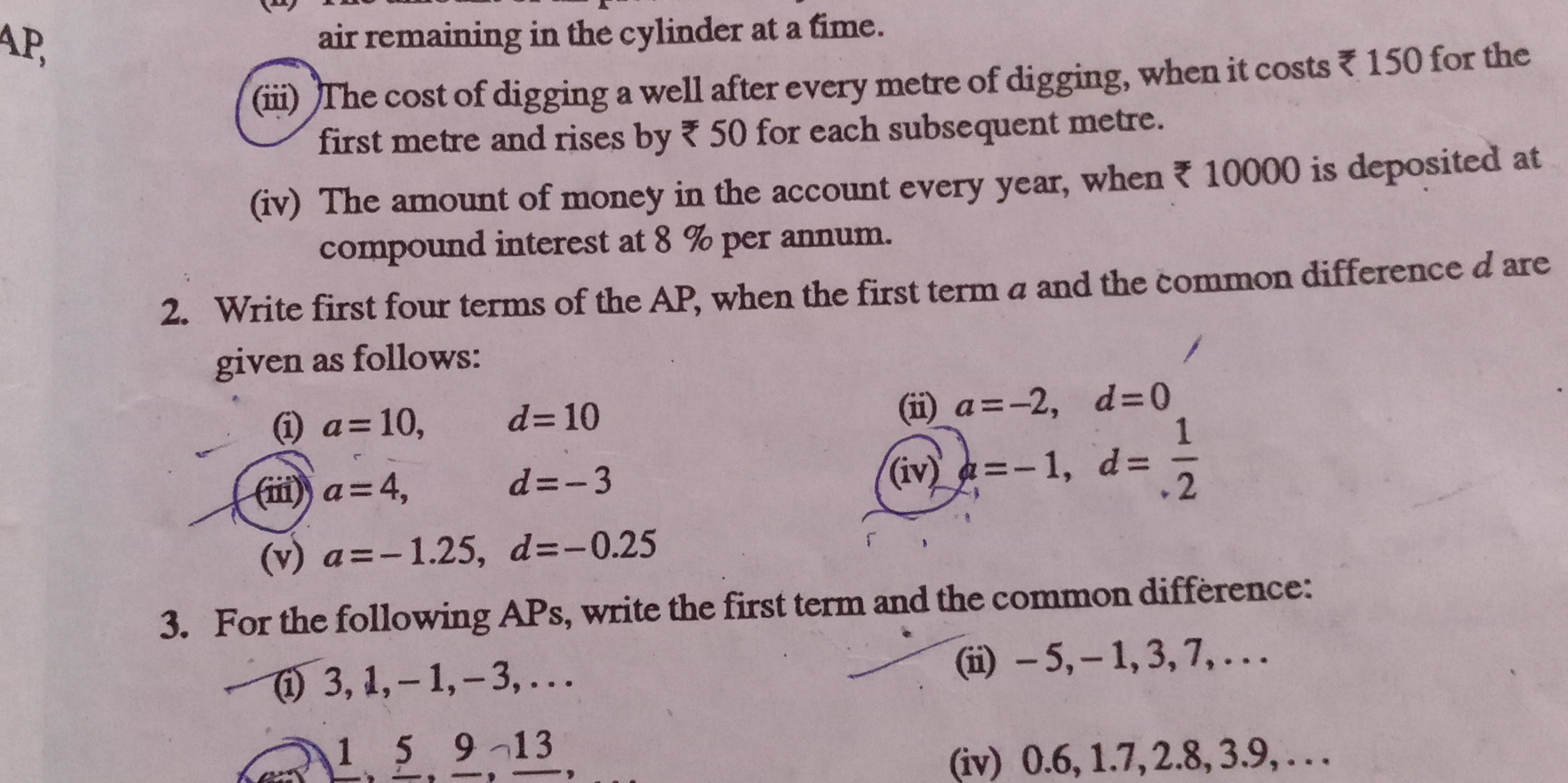Write first four terms of the AP, when the first term a and the common difference d are given as follows: (i) a=10, d=10 (ii) a=-2, d=0 (iii) a=4, d=-3 (iv) a=-1, d=1/2 (v) a=-1.25... Write first four terms of the AP, when the first term a and the common difference d are given as follows: (i) a=10, d=10 (ii) a=-2, d=0 (iii) a=4, d=-3 (iv) a=-1, d=1/2 (v) a=-1.25, d=-0.25.

Understand the Problem
The question is asking to find the first four terms of an arithmetic progression (AP) based on given values of the first term (a) and the common difference (d). It presents multiple cases with different (a, d) values for users to solve.
Answer
(i) $10, 20, 30, 40$; (ii) $4, 1, -2, -5$; (iii) $-1, -0.5, 0, 0.5$
Answer for screen readers
The first four terms of the AP for each case are:
- (i) ( 10, 20, 30, 40 )
- (ii) ( 4, 1, -2, -5 )
- (iii) ( -1, -0.5, 0, 0.5 )
Steps to Solve
- Understanding the Arithmetic Progression (AP)
An Arithmetic Progression is defined by its first term ( a ) and common difference ( d ). The ( n^{th} ) term of an AP can be computed using the formula:
$$ T_n = a + (n-1)d $$
- Finding the First Term and Common Difference
For each given case, identify the first term ( a ) and the common difference ( d ):
- (i) ( a = 10, d = 10 )
- (ii) ( a = 4, d = -3 )
- (iii) ( a = -1, d = \frac{1}{2} )
- Calculating the First Four Terms
Now, calculate the first four terms of the AP for each given case as follows:
Case (i):
- First term: ( T_1 = a = 10 )
- Second term: ( T_2 = a + d = 10 + 10 = 20 )
- Third term: ( T_3 = a + 2d = 10 + 2(10) = 30 )
- Fourth term: ( T_4 = a + 3d = 10 + 3(10) = 40 )
Case (ii):
- First term: ( T_1 = a = 4 )
- Second term: ( T_2 = a + d = 4 - 3 = 1 )
- Third term: ( T_3 = a + 2d = 4 + 2(-3) = -2 )
- Fourth term: ( T_4 = a + 3d = 4 + 3(-3) = -5 )
Case (iii):
- First term: ( T_1 = a = -1 )
- Second term: ( T_2 = a + d = -1 + \frac{1}{2} = -0.5 )
- Third term: ( T_3 = a + 2d = -1 + 2 \times \frac{1}{2} = 0 )
- Fourth term: ( T_4 = a + 3d = -1 + 3 \times \frac{1}{2} = 0.5 )
The first four terms of the AP for each case are:
- (i) ( 10, 20, 30, 40 )
- (ii) ( 4, 1, -2, -5 )
- (iii) ( -1, -0.5, 0, 0.5 )
More Information
An arithmetic progression is a fundamental concept in mathematics, where each term increases or decreases by a constant value, which is the common difference. This problem helps reinforce understanding of sequences and the ability to manipulate algebraic expressions.
Tips
- Forgetting to use the correct formula for ( T_n ).
- Miscalculating the values of ( d ) leading to incorrect terms.
- Confusing the order of operations; always start by calculating the first term before moving to subsequent terms.
AI-generated content may contain errors. Please verify critical information